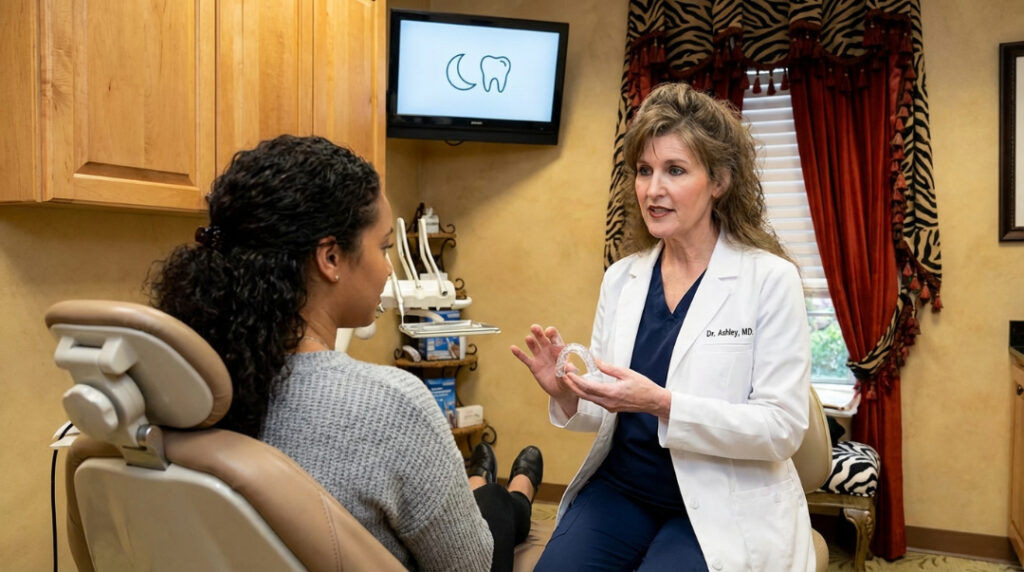Yes, night guards help relieve TMJ symptoms by reducing teeth grinding and clenching that strain the jaw joint. They cushion the bite, protect teeth from wear, and promote muscle relaxation, but effectiveness depends on getting a custom-fitted guard from a qualified dentist like Buford Dentist.

The temporomandibular joint, or TMJ, connects your jawbone to your skull. It is one of the most complex joints in the body, responsible for chewing, speaking, and swallowing. When the joint becomes strained or inflamed, it leads to temporomandibular joint disorder, or TMD.
Common symptoms include:
TMJ problems often start from habits like clenching or grinding your teeth at night, known as bruxism. Over time, the constant pressure wears down enamel and tightens jaw muscles, creating inflammation and misalignment.

Night guards, also called occlusal splints, are dental appliances designed to protect your teeth while you sleep. Their main purpose is to reduce the harmful effects of grinding and clenching that worsen TMJ pain.
A night guard creates a thin barrier between your upper and lower teeth. This prevents direct contact and stops the friction that causes enamel erosion and joint strain. The cushioning absorbs the force of clenching, allowing the jaw muscles to relax overnight.
A well-designed guard positions your jaw in a balanced, neutral state. This reduces muscle tension and helps relieve the stiffness you might feel in the morning. Many patients notice a drop in headaches and soreness after consistent use.
When grinding decreases, your muscles relax and your sleep becomes deeper. Rested muscles are less inflamed, leading to less jaw pain, fewer morning headaches, and a calmer nervous system overall. Since sleep quality directly affects jaw tension, exploring the link between TMJ and Sleep Habits can help you understand how rest impacts long-term relief.

Night guards are a proven tool for managing TMJ symptoms. Yet, their success depends on the cause of the disorder and the quality of the appliance.
They work best when:
In these cases, the guard minimizes grinding and relieves muscle tension that contributes to TMJ discomfort.
If TMJ pain stems from arthritis, severe misalignment, or joint damage, a night guard alone will not solve the problem. Some patients require additional care such as orthodontic correction, physical therapy, or medication to reduce inflammation.
Store-bought guards, especially boil-and-bite versions, may seem convenient but often fit poorly. A poor fit can worsen your bite, strain your muscles further, or even lead to more pain.
A comprehensive TMJ treatment plan may also include:
Buford Dentist emphasizes that night guards are one part of a larger management plan, not a standalone cure.

Choosing the correct guard is essential to achieve lasting TMJ relief.
Custom night guards are designed using impressions of your teeth. They fit precisely, stay secure, and distribute pressure evenly across the bite. Over-the-counter versions are mass-produced and rarely align correctly. This mismatch can cause additional jaw strain or gum irritation.
Dentists choose between upper and lower guards based on your bite pattern and comfort.
The best choice depends on your anatomy and the source of your TMJ stress, which Buford Dentist evaluates before recommending one.
Hard acrylic guards are durable and stabilize the bite for severe clenchers. Soft guards cushion better but wear down faster and may encourage more chewing movements. Hybrid versions combine both materials to balance comfort and durability.
When selecting a night guard, check for:
Custom guards cost more upfront but last longer and protect dental work from costly repairs. Over-the-counter versions tend to wear out faster and often need frequent replacement.
Maintenance ensures comfort and hygiene.

Wearing a night guard may feel unusual at first. Expect mild tightness or increased saliva for a few days. Within one to two weeks, your mouth will adapt.
Most users notice reduced jaw stiffness or headaches after two to four weeks. For significant TMJ improvement, consistent nightly use over several months is key.
Schedule a follow-up with Buford Dentist to ensure your guard fits properly. Minor bite adjustments may be needed as your muscles relax. Regular checks prevent uneven wear or discomfort.
Contact your dentist if you experience:
These signs indicate the guard might need refitting or additional treatment.